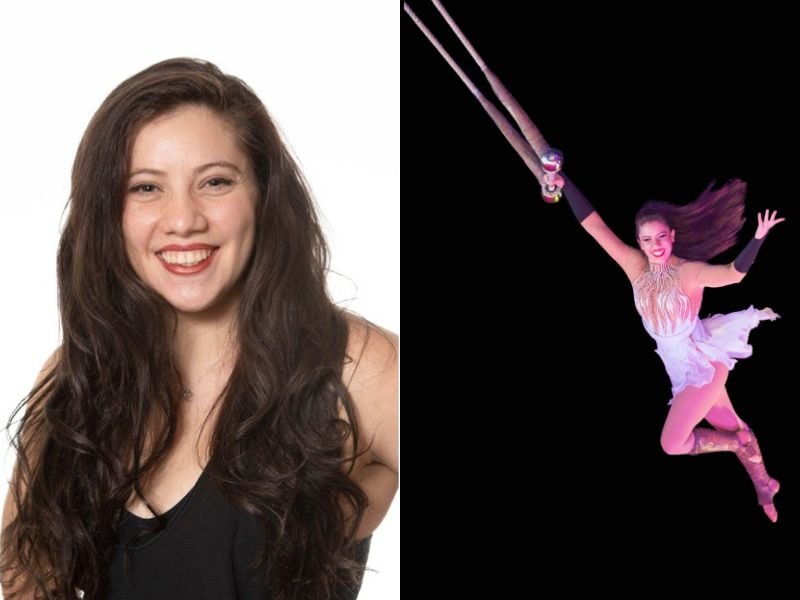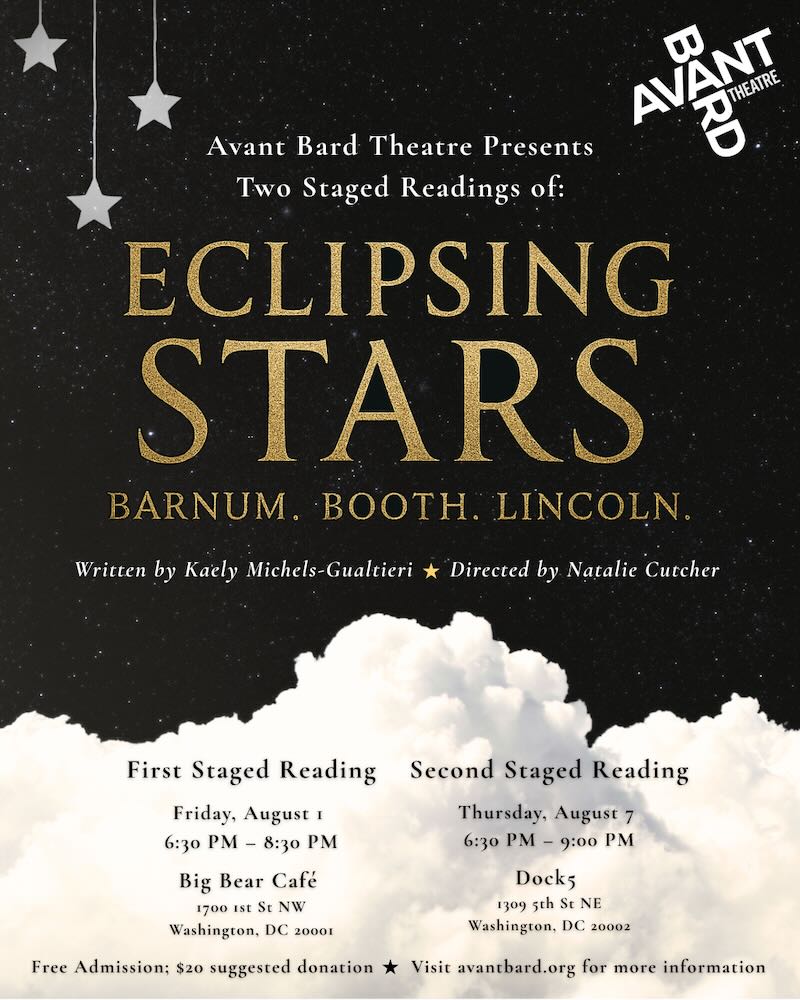By Avant Bard Theatre
This summer, Avant Bard Theatre invites audiences behind the curtain to witness the creation of a bold new work — Eclipsing Stars, written by playwright and professional trapeze artist Kaely Michels-Gualtieri, whose unique perspective shapes this new play’s blend of circus, Shakespeare, and American history.

The following interview comes in advance of three public presentations of Eclipsing Stars: a workshop reading on July 24 and two staged readings on August 1 and August 7, all followed by talkbacks with the playwright. These events are an essential part of the play’s development, giving Kaely and the team the chance to hear the piece with an audience and refine it further.
Avant Bard: As both a playwright and professional trapeze artist, your career bridges two seemingly different worlds. How did you come to combine circus and theater in your artistic practice?
Kaely Michels-Gualtieri: For over a decade, I was a professional swinging trapeze artist, performing my solo act with companies including Cirque du Soleil and Ringling Brothers. My career took me across 14 countries, three continents, and multiple awards. Then, everything changed.
While performing with Cirque du Soleil, I sustained several debilitating injuries that left me unable to perform — and I’m still in recovery. Like Kafka’s Gregor Samsa, I awoke one morning in a body I no longer recognized. I had collided headfirst, quite literally, with my greatest fear: Is it still possible to soar when one can no longer fly? My world is no longer defined by defying gravity, but by learning to live within its weight. And to my surprise, in my fall, I found something new — my voice.
P.T. Barnum’s narrative arc in Eclipsing Stars mirrors my own: master of spectacle reckoning not just with performance, but with the cost of admission. Akin to Barnum, I once built worlds meant to dazzle, to distract, to defy death. But when the spotlight fades, what happens when a body and a curtain fall? What lingers in the dark? Writing this play allowed me to explore those questions — not just with my mind, but with the muscle memory of someone who has flown, fallen, and found meaning in both.
The essence of the theater is its ability to transform feeling into form. My artistic voice emerged from a fusion of fear and flight, of tension and trust, of that suspended moment when the story lifts off the ground and becomes something more. That moment — that lift — is central to both my artistic identity and this play. And if, for even a heartbeat, the audience takes flight, then the circus in this play has done its job.
Eclipsing Stars blends history, Shakespeare, and circus metaphor in a unique and compelling way. What inspired you to tell the story of the Booth brothers through this lens?
The first big circus contract I ever signed was with Barnum’s very own Greatest Show on Earth. I toured the United States and matured as a trapeze artist under his spotlight. But it wasn’t until I became a student that I learned Barnum rose to fame at the very same time as the Booth theatrical dynasty — against the volatile backdrop of the American Civil War. From there, the idea took hold: the story of the Booth brothers should be told through the eyes of the Greatest Showman on Earth.
Historical accuracy gave me the structure. Shakespeare gave me the language. And the circus gave me the metaphor. I wanted to explore the performance of ideology: how two brothers, raised on the same stage, could become mirrors, shadows, and eventually, foils. In Eclipsing Stars, Barnum becomes both ringmaster and reckoner, guiding us through a three-ring collision of belief, doubt, and legacy.
As a trapeze artist, I’ve always lived in metaphor — suspended, defying gravity, trusting invisible forces. That perspective shaped the way I approached their story. The circus became the natural framework: a place of spectacle, illusion, and danger, where performers risk everything for a fleeting moment of awe. And what is history if not a spectacle we retell to make sense of the fall?
As this play continues to develop through readings and talkbacks, what are you most hoping to learn from these early audiences?
What excites me most about these early readings is the opportunity to listen — really listen — to how the story lands on an audience. This play asks big questions about fate versus free will, legacy versus inheritance, and performance versus spectacle. But it also lives in the small moments: in the glances between brothers, the pauses before a line, the weight of what isn’t said. I want to know how those moments feel in the room. Are the stakes clear? Do the themes connect? Are the transitions fluid? Is Barnum guiding the audience — or obscuring the path?
I’m especially interested in how people respond to seeing these prominent historical figures (Abraham Lincoln, John Wilkes Booth, and P.T. Barnum) reframed. I want to know when the audience leans in — and when they pull away. This information will help me shape the next version of the play.
Eclipsing Stars is an ambitious play, weaving together history, Shakespeare, and circus metaphor. I’m eager to learn what resonates emotionally, and where the story needs more clarity or breath. Ultimately, I’m not looking for perfection at this stage — I’m looking for impact. I want to know how the play breathes when it’s out of my hands and in someone else’s imagination.

Upcoming Readings of Eclipsing Stars by Kaely Michels-Gualtieri
Workshop Reading – District Fringe (Directed by Erin Abney)
Thursday, July 24, 2025, at 7:30 PM
Flicker Bar (4340 Connecticut Ave NW, DC)
Free admission – no reservations required
Staged Reading #1 (Directed by Natalie Cutcher)
Friday, August 1 at 6:30 PM
Big Bear Café (1700 1st St NW, DC)
Suggested donation: $20 – reserve tickets online.
Staged Reading #2 (Directed by Natalie Cutcher)
Thursday, August 7 at 6:30 PM
Dock5 (1309 5th St NE, DC)
Suggested donation: $20 – reserve tickets online.
 Avant Bard Theatre produces thought-provoking theater dedicated to interrogating the classics and classical themes through innovative, bold approaches in intimate settings. Gratefully in its 35th season, Avant Bard has delivered high-quality, diverse, and accessible arts to the Washington, DC, region since 1990.
Avant Bard Theatre produces thought-provoking theater dedicated to interrogating the classics and classical themes through innovative, bold approaches in intimate settings. Gratefully in its 35th season, Avant Bard has delivered high-quality, diverse, and accessible arts to the Washington, DC, region since 1990.



